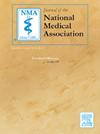改善黑人心力衰竭患者预后的五大考虑因素:初级保健临床医生指南
IF 2.5
4区 医学
Q1 MEDICINE, GENERAL & INTERNAL
引用次数: 0
摘要
与美国其他种族和族裔相比,黑人患者在更年轻的时候就会出现心力衰竭,结果也更糟,比如死亡率更高。尽管最近心力衰竭的医学治疗有了显著的进步,但这些较差的结果仍然存在。提供了多种原因来解释这种情况,包括但不限于黑人患者心血管风险因素的基线群集较高,不充分使用心力衰竭指南指导的药物治疗以及延迟转诊晚期心力衰竭治疗和干预措施。考虑到健康的社会和结构决定因素、解决结构性不平等/偏见、实施质量改进方案、早期诊断和预防的战略干预措施对于弥合种族/民族差距和提高黑人心力衰竭患者的寿命至关重要。在这篇综述中,我们提出了基于证据的解决方案,为初级保健医生解决这些挑战提供了一个框架,以实现治疗分配的公平性,并改善所有心力衰竭患者的预后。本文章由计算机程序翻译,如有差异,请以英文原文为准。
Top five considerations for improving outcomes in black patients with heart failure: A guide for primary care clinicians
Black patients develop heart failure at younger ages and have worse outcomes such as higher mortality rates compared to other racial and ethnic groups in the United States. Despite significant recent improvements in heart failure medical therapy, these worse outcomes have persisted. Multiple reasons have been provided to explain the situation, including but not limited to higher baseline cluster of cardiovascular risk factors amongst Black patients, inadequate use of heart failure guideline directed medical therapy and delayed referral for advanced heart failure therapies and interventions. Strategic interventions considering social and structural determinants of health, addressing structural inequalities/ bias, implementation of quality improvement programs, early diagnosis and prevention are critically needed to bridge the racial/ ethnic disparities gap and improve longevity of Black patients with heart failure. In this review, we propose evidence-based solutions that provide a framework for the primary care physician addressing these challenges to engender equity in treatment allocation and improve outcomes for all patients with heart failure.
求助全文
通过发布文献求助,成功后即可免费获取论文全文。
去求助
来源期刊
CiteScore
4.80
自引率
3.00%
发文量
139
审稿时长
98 days
期刊介绍:
Journal of the National Medical Association, the official journal of the National Medical Association, is a peer-reviewed publication whose purpose is to address medical care disparities of persons of African descent.
The Journal of the National Medical Association is focused on specialized clinical research activities related to the health problems of African Americans and other minority groups. Special emphasis is placed on the application of medical science to improve the healthcare of underserved populations both in the United States and abroad. The Journal has the following objectives: (1) to expand the base of original peer-reviewed literature and the quality of that research on the topic of minority health; (2) to provide greater dissemination of this research; (3) to offer appropriate and timely recognition of the significant contributions of physicians who serve these populations; and (4) to promote engagement by member and non-member physicians in the overall goals and objectives of the National Medical Association.

 求助内容:
求助内容: 应助结果提醒方式:
应助结果提醒方式:


